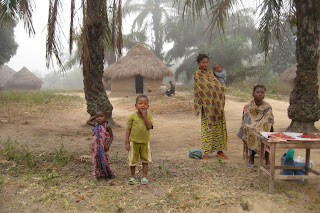Today's blog covers last Saturday's return from Laputa in the early misty morning. Friday we had driven to Mwene-Ditu for missionary interviews then on to Laputa. The road from Mbuji-Mayi to Mwene-Ditu is paved but badly chuck-holed. It dates from the 1960's. From Mwene-Ditu to Laputa is dirt. Since it is now the dry season we only had to deal with dust and bad ruts. The big trucks drive right down the middle leaving big ruts. Driving too close to the sides could cause a tip-over.
Saturday morning we awoke to heavy mist.
People live along the road amid palm trees. These palms produce palm nuts for making palm oil. Our driver said that few people live away from the road and where water is available. Thus there are miles and miles of virtually uninhabited areas.
The houses all look neat. In the cities there is trash everywhere.
A roadside stand selling beans (I think). Notice the woman is wrapped up against the morning chill. Who would have expected chilly weather in the Congo?
Now for the road. This is indeed the national highway from the capital Kinshasa in the north to Lubumbashi in the south. During the rainy season it is virtually impassable. Very seldom are the roads bulldozed flat so deep swells develop from the big trucks. When it rains it's difficult to gage the depth of the puddles. Put the truck in 4-wheel drive, reve up the engine, follow the tracks and pray.
Two months ago we had to stop and with shovel fill in some ruts on this hill. The photos don't show the roughness of the road.
Transporting loads on big trucks is very expensive. It's cost effective to put loads on bicycles and transport corn or fish or flour along the dusty roads. Thieves and brigands are not a problem. The men push all day, stopping to eat at roadside restaurants and sleeping in the tall grass at night.
This man may have a heavy load of dried fish bought at a cheap price in Lubumbashi for sale in Mbuji-Mayi for a good profit. The cost: a month of drudgery along the 1000 kilometer road. It's not flat. There are hills and ruts and rocks and dust. The men are wiry.
The loads are too big to allow biking.
Several months on the road. The driver said they were Kasai people from the Mbuji-Mayi region. When the Belgians were in the Congo, they recruited the Kasai to work the mines in Lubumbashi. In the 1960's, the people of Lubumbashi persecuted these industrious Kasai, killing many and driving the rest back north. That's why the village of Laputa has a Stake of Zion and over 2000 members of the Church. They joined the Church in the south but were driven north as refugees.
To market swinging her arms goes this woman with a heavy basket of cassava roots on her head. The roots will be prepared and then ground into flour to make Fou-fou, the stable food of the Congo.
Vegetables to market. We eat this once a week. A strong spinach type flavor.
Looks like cabbages. The women carry heavy things on their head. The men push heavy loads.
It's a hard life here.















